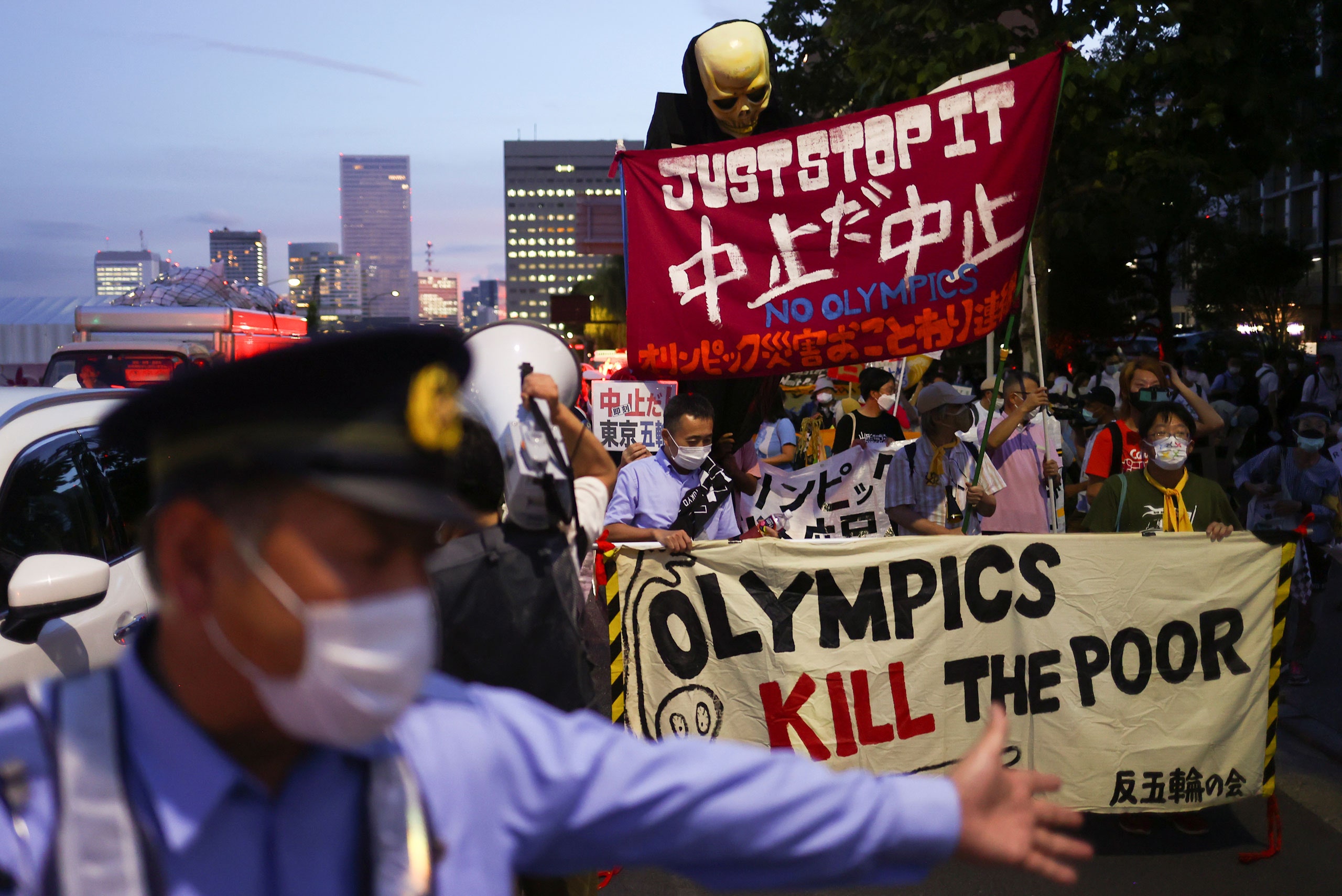Tokyo’s Olympics Have Become the Anger Games
I thought this was an interesting article. Apparently, a lot of people in Japan are disappointed about the Olympics. Many think they should have been postponed or cancelled altogether. The popularity ratings of Japan's Prime Minister Suga are at an all time low.

I don't think I've ever seen an Olympics which has been as messed up as this one. One quoted in the article called it "a nightmare that doesn't end."
Should they have cancelled it?
I've been thinking the same thing every time I hear of some sporting event being cancelled or teams having to forfeit over the virus. They're playing to empty or mostly-empty stadiums, and the fan enthusiasm has been somewhat lackluster.
Yet, there's still this idea that "the show must go on" no matter what. Some people seem to view it with a sense of urgency or absolute necessity. It wouldn't matter if there was a zombie apocalypse or if it was the aftermath of a nuclear war; there'd still be some people who would want the Olympics to go on no matter what.
I have nothing against the Olympics, but I never considered them that important or essential.
I thought this was an interesting article. Apparently, a lot of people in Japan are disappointed about the Olympics. Many think they should have been postponed or cancelled altogether. The popularity ratings of Japan's Prime Minister Suga are at an all time low.
It’s surely a coincidence that Thomas Bach, the International Olympic Committee’s chief, arrived in Tokyo on July 8, 2021, a hundred and sixty-eight years to the day since an American naval fleet sailed into Edo harbor unannounced, forcibly ending more than two centuries of Japanese isolation and contributing to the nation’s ensuing societal and political turmoil. Bach’s appearance portends an eerily similar moment of high anxiety for the people and politicians of Japan: the Tokyo 2020 Summer Olympics, finally set to kick off officially on Friday, after a yearlong delay.
Once again, Japan finds its quarantine broken, not by a foreign fleet but by the arrival of thousands of foreign Olympians and their entourages. Now the city’s mood ricochets between fury and resignation, fuelled by a toxic mix of unpopular policies and scandals: Prime Minister Yoshihide Suga’s unalloyed boosterism for a sporting event that few citizens seem to truly want; a restriction of the operating hours of eateries and the sale of alcohol, measures intended to blunt the spread of COVID-19; and, perhaps most grating, promises of safety that ring hollow. Suga’s insistence that the Olympics will serve as “proof that humanity has defeated the coronavirus,” despite evidence to the contrary, and Bach’s claims of “zero” risk to the public, despite athletes in the Olympic Village and dozens of other participants testing positive for the coronavirus, have inspired more unease than confidence—particularly given that the government has managed to fully vaccinate little more than twenty per cent of the Japanese population.
Polls have consistently shown that a majority of people in Japan would prefer that the Games be postponed again or abandoned altogether, and approval ratings of Suga’s cabinet are at an all-time low. As COVID-19 cases rose relentlessly throughout July, the Prime Minister was forced to declare an official state of emergency in Tokyo from July 12th through August 22nd—the fourth since the start of the pandemic, last year, and a span of days that will cover the entirety of the Summer Games. On Tuesday, a cabinet minister gave an anonymous interview with the Asahi Shimbun, describing the decision as “the worst-case scenario” for the government.
There are a lot of other worst-case scenarios. These are the first Olympics to be held mostly without spectators, who are being asked to refrain from gathering on the public roads being used for marathons, triathlons, and cycling events. The prospect of competing in empty stadiums has “perplexed” athletes. “A lot of people’s tax money is going to hold these Olympics,” Maya Yoshida, the captain of Japan’s men’s soccer team, said. “Despite that, people can’t go and watch. So you wonder about who the Olympics is for, and what it is for.” A number of high-profile sponsors seem to be wondering, too. Toyota announced on Monday that it would not air Olympics-related advertisements on Japanese television, citing “mixed public sentiment towards the Games.” Other companies quickly followed suit: NEC, Panasonic, and Fujitsu are among the firms that have said they won’t be sending executives to the opening ceremony.
In my own neighborhood, in the western suburbs of Tokyo, there is little to indicate enthusiasm for the proceedings. In the local park, public benches have been roped off with metres of bright-orange temporary fencing, to prevent groups from gathering, giving the area the dismal appearance of a crime scene. About the only signs of the impending Games are the lampposts from which “Tokyo 2020” banners are hung, fluttering weakly in an oppressive midsummer haze that reminds one of why the 1964 Tokyo Olympic Games were actually held in October. As a longtime resident of Tokyo, I recall the widespread unease that many of my friends expressed upon hearing the announcement, in 2013, that we would host the Summer Games in 2020. The idea of holding a large-scale outdoor sporting event at such a dangerously hot time of year seemed ill advised. Now, with the coronavirus added to the mix, it feels like madness.

Ambivalence and even outright opposition are not uncommon reactions among the residents of cities hosting Olympiads, but negativity often gives way to enthusiasm once the competition actually begins. The 2002 Winter Games, in Salt Lake City, got off to a bumpy start, but they are remembered with pride by locals today. Even the beloved 1964 Tokyo Olympics had its critics. After they were first announced, in 1959, public opinion was mixed; today, they’re widely regarded as a watershed moment in Japan’s reinvention of itself as a global economic power. Were it not for the cosmic wild card of COVID-19, it is likely that the 2020 Games would have benefitted from this rebound effect as well. But the coronavirus makes comparisons to previous Games all but impossible. The problems facing Tokyo’s Olympic organizers are a combination of the familiar—public opposition, budget overruns, logistical inconveniences, scandals—and the unprecedented hazards of holding an international sporting event amid a global pandemic still very much not under control.
The same might be said of the Games themselves, which seem to generate some shocking headline day after day. Some of these news events are relatively minor gaffes, such as Bach’s mistaking Japanese for “Chinese people” during a recent address. Others are more troubling: Cornelius, the Japanese rock musician hired to score the opening ceremonies, stepped down on Monday after old interviews surfaced in which he bragged about physically and sexually abusing classmates as a schoolboy, including one with disability. And some seem almost designed to sow doubt and confusion, such as the Tokyo organizers’ startling suggestion on Tuesday that they might pull the plug at the last minute, anyway. “These Olympics,” a Japanese journalist friend said to me, after this latest revelation, “are like a nightmare that doesn’t end.”
The irony is that, when the opening ceremony commences, on Friday, the Games will become a collective nightmare. Tokyo is currently recording COVID-19 cases at alarmingly high levels; Wednesday’s eighteen hundred and thirty-two cases represent a number not seen since January, before the introduction of vaccines to the country. While these Olympics might well go down as the least wanted in history, they will have succeeded in bringing a nation together, just not quite in the way that their organizers envisioned. The spectre of infection links the citizens of Tokyo in a far more intimate way than the people of any host city before: boosters and critics, participants and avoiders alike, watching, waiting, and hoping for the best.
I don't think I've ever seen an Olympics which has been as messed up as this one. One quoted in the article called it "a nightmare that doesn't end."
Should they have cancelled it?
I've been thinking the same thing every time I hear of some sporting event being cancelled or teams having to forfeit over the virus. They're playing to empty or mostly-empty stadiums, and the fan enthusiasm has been somewhat lackluster.
Yet, there's still this idea that "the show must go on" no matter what. Some people seem to view it with a sense of urgency or absolute necessity. It wouldn't matter if there was a zombie apocalypse or if it was the aftermath of a nuclear war; there'd still be some people who would want the Olympics to go on no matter what.
I have nothing against the Olympics, but I never considered them that important or essential.
Last edited:

